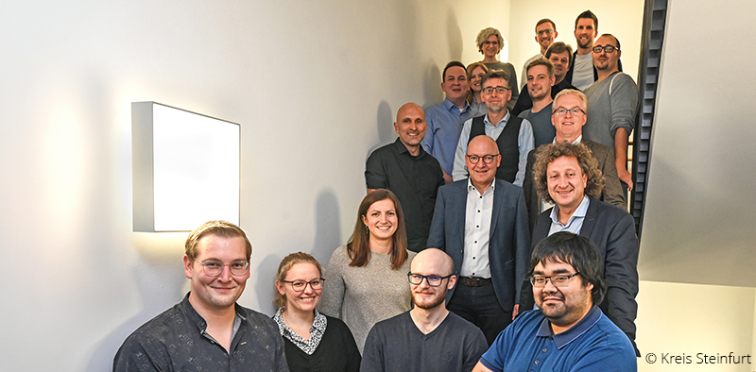Workshop on the Service Innovation Lab Steinfurt

The Trust and Law Enforcement sub-projects of the DFG research group "Digital Medium-sized City of the Future" (DMDZ) at the University of Münster were involved in the kick-off of the Service Innovation Lab of the Smart Region Coordination Office of the District of Steinfurt on November 14, 2023. The attendees came from different parts of the administration, which provided a broad pool of knowledge about the processes within the administration. The program was divided into three workshops, two of which were provided by the DMDZ.
A brief impulse on trust in medium-sized cities was presented for the trust sub-project. Trust is usually defined as the willingness to be vulnerable and to relinquish control over processes. Trust is therefore considered an essential characteristic of functioning urban ecosystems: without mutual trust between the actors in a city, innovation and collaboration cannot develop. The stakeholders are then not prepared to take risks, e.g. to invest in joint projects, because there is no common basis: shared values and a common goal. The (digital) development of medium-sized cities into liveable living and working spaces therefore requires trusting and value-based collaboration between all stakeholders in the medium-sized city. In the context of digitalization, it is therefore important to understand how and which players interact and what risks they take in each case. Only with this understanding can the "digital medium-sized city" ecosystem be managed. With this goal in mind, participants worked together in the subsequent workshop to develop models of existing relationships of trust in medium-sized cities. This was followed by a discussion of current and planned future measures to manage and maintain healthy relationships of trust between these groups. We will hold further workshops to obtain a broader picture of relationships of trust in medium-sized towns.
In the workshop of the law enforcement sub-project, the actual and target states of the operationalization of laws for service provision were interactively surveyed.
To this end, a discussion round was used to gather information on how a law is currently operationalized and where problems arise. An important point of the ACTUAL survey of law operationalization is the questions of responsibility and resource availability and allocation, as well as staff awareness. Stakeholders also play an important role, as the effects of operationalization are largely determined by the internal and external relationships of the stakeholders.
A variant of the 635 method was used to develop the target state. The aim was to refine the ideas of the participants in successive rounds in order to either highlight links, include new ideas or uncover contradictions. The desire for more standardized processes across authorities and inter-municipal cooperation became clear. There was disagreement as to whether components should be provided top-down for municipal use or whether the development of components should take place entirely at municipal level. Incentives for the use of digital services should also be created to make them more attractive to citizens. Legislators should consider operationalization and digitalization when formulating new laws.
The Steinfurt district press release on the workshop can be found here: https://www.presse-service.de/data.aspx/static/1143987.html


